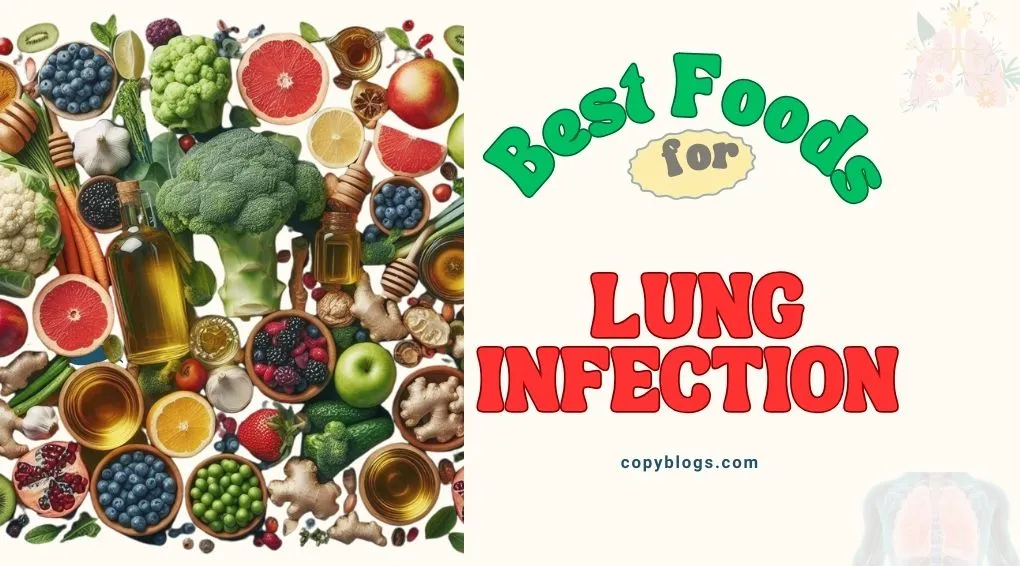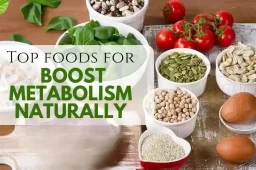
Best Foods For Lung Infection
- March 11, 2025
- by
- Shanaya
Lung infection is caused by bacteria, viruses, or fungi. The infection has different levels, from mild to severe. Nutrition plays an important role for individuals being treated for lung infection. Choosing suitable, nutritious foods can help them enhance their overall resistance and support the treatment process. Below are the best foods for lung infection. They also work well to improve lung function and overall health.
Which are the best foods for lung infection?
Water: One of the Best Foods for Lung Infection
When suffering from a lung infection, people should drink plenty of water to avoid dehydration, which can make the body feel tired. Additionally, water can help increase blood circulation to organs, including the lungs. Furthermore, water is one of the best foods for lung infection because it helps thin phlegm, making individuals feel more comfortable. Drinking plenty of water will also help eliminate toxins and protect the lungs. Besides plain water, people can also enjoy smoothies or juices to provide more vitamins and minerals to strengthen the body’s resistance. However, avoid using ice, as it may irritate the respiratory system.
Cruciferous Vegetables: Top Choices Among the Best Foods for Lung Infection
These vegetables, including broccoli, cauliflower, and cabbage, contain antioxidants that help the body eliminate toxins and free radicals. Thus, cruciferous vegetables are among the best foods for lung infection due to their ability to protect the lungs and improve cardiovascular health. You can add these vegetables to your daily menu to help keep your lungs healthy.
Foods Rich in Carotene
Carotene is an antioxidant that can help prevent the effects that cause lung cancer. Carotene is particularly abundant in orange or red vegetables and fruits. Carrots and bell peppers are great choices as the best foods for lung infection, offering powerful protection for your lungs.
Foods Rich in Omega-3 Fatty Acids
Omega-3 fatty acids are very beneficial for health. Supplementing omega-3 reduces inflammatory responses in individuals with pneumococcal pneumonia. Foods rich in Omega-3 fatty acids include fish, such as salmon, mackerel, tuna, etc., and nuts (walnuts, almonds, etc.), and can be added to your daily menu to help protect the lungs.
Foods Rich in Folate (Vitamin B9): Best foods for lung infection
Foods containing folate are excellent at preventing cancer, especially lung cancer. You can add spinach, asparagus, beets, and lentils to your daily diet as some of the best foods for lung infection or to reduce the risk of lung cancer.
Garlic
Garlic contains high levels of allicin and flavonoids. These substances stimulate the production of glutathione, eliminating toxins from the lungs. They also reduce inflammation, fight infection, and destroy free radicals to support the treatment of lung diseases. Garlic stands out as one of the best foods for lung infection that everyone can consume.
Foods Rich in Vitamin C
Vitamin C is essential for the body. Eating plenty of foods containing vitamin C, such as kiwi, green and red bell peppers, oranges, lemons, grapefruits, vegetable juices, tomatoes, pineapples, mangoes, watermelons, etc., helps the lungs transport oxygen efficiently throughout the body.
Foods Rich in Magnesium
Magnesium is a mineral often recommended by doctors for individuals with lung diseases. It helps increase lung capacity and improve respiratory efficiency. Magnesium is found in a variety of nutrient-dense foods, including whole grains, nuts, seeds, legumes, and various fruits and vegetables.
Protein-Rich Foods
A protein-rich diet is recommended for people with pneumonia. Nuts, beans, white meat, and other protein-rich foods have anti-inflammatory properties and support the body’s ability to heal and regenerate tissues.
Berries
Berries are good for the lungs as they contain many antioxidants, polyphenols, anthocyanins, beta-carotene, lutein, and zeaxanthin. These compounds help protect the lungs from diseases and infections and reduce the risk of cancer.
Apples
According to experts, apples are one of the best foods for lung infection. They contain vitamins and micronutrients that maintain respiratory function and prevent lung diseases. Eating apples not only helps prevent lung cancer but also benefits people with asthma.
Grapefruit
Research shows that minerals and vitamins in grapefruit are very effective in combating lung cancer cells and limiting the disease progression.
Pomegranate
Pomegranates are rich in antioxidants that benefit health. Their nutrients can slow the growth of lung tumors.
Ginger
Anti-inflammatory properties in ginger help filter out remaining pollutants in the lungs and eliminate cancer cells. These natural properties can also help individuals with pneumonia improve symptoms and speed up recovery.
Turmeric
Curcumin, an important component in turmeric, has the ability to reduce lung damage caused by pneumonia by improving excessive immune responses and inhibiting inflammatory reactions. Turmeric also helps alleviate chest pain, one of the initial symptoms of pneumonia. Turmeric also acts as a mucus thinner, helping to remove mucus from the bronchial tubes that cause respiratory issues.
Honey
Historically, honey has been known for its antibacterial properties and wound healing aids. When suffering from pneumonia, consuming honey can provide antibacterial and anti-inflammatory benefits. It helps prevent severe lung tissue damage and helps individuals improve symptoms effectively.
Green Tea
Experts recommend green tea as a refreshing daily beverage for lung and heart health. Its antioxidant properties help remove harmful toxins from the lungs, inhibit free radicals, and thus help protect and improve lung function.
Olive Oil
Olive oil contains anti-inflammatory and antioxidant substances like vitamin E and polyphenols. Therefore, if you want good lung health, you shouldn’t overlook this food!
Some Dietary Principles for Individuals with Pneumonia
- Meals should be divided into small portions to maintain stable energy levels in the body. Small meals also make it easier for individuals to eat, avoid skipping meals, and prevent nutrient deficiencies.
- When planning a nutritional menu for individuals with pneumonia, understand which foods to eat and avoid to select the best options.
- Individuals with pneumonia should consume a full range of nutrients to meet energy and nutritional needs, aiding faster recovery after illness.
- If you are uncertain about the best foods for lung infection, talk with your doctor or qualified nutritionist for tailored advice.
Bottom line
Incorporating the best foods for lung infection into your diet can significantly support the treatment process and enhance overall lung health. By following a balanced diet filled with these beneficial foods, individuals can boost their immune system, reduce inflammation, and expedite recovery, paving the way to better lung health. Taking proactive steps through proper nutrition is essential for maintaining healthy lungs and overall well-being—start today to give your lungs the care they deserve!
You may also like:
Healthy diet for healthy liver function | Foods that make you hungrier



